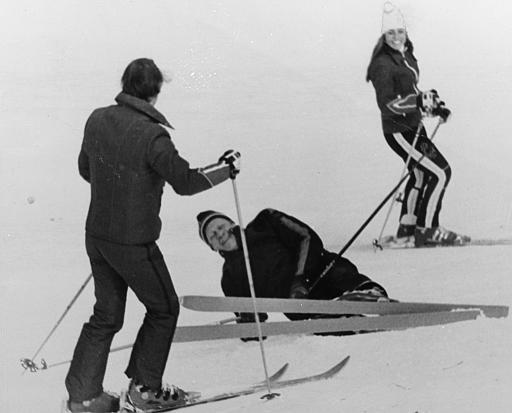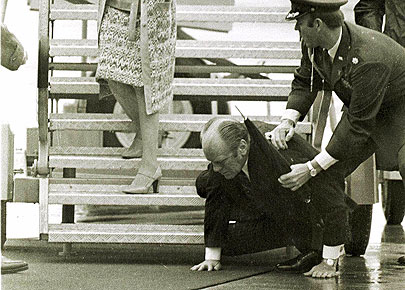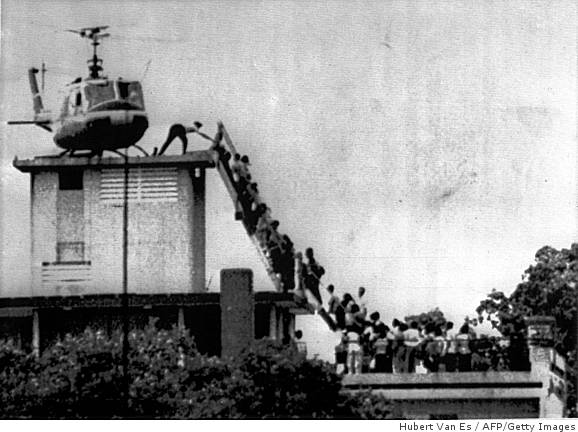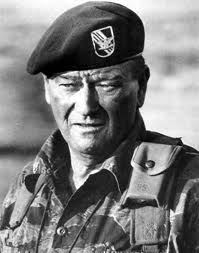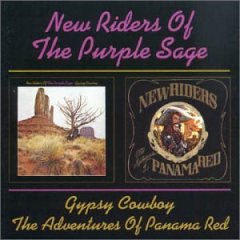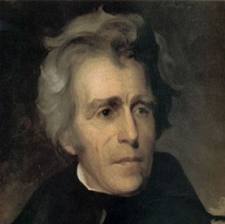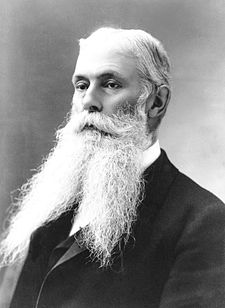
Some Say Alzheimer's Disease afflicted President Reagan
toward the end of his second term.
In U.S. History, which candidate for president spoke these words to his supporters during his campaign?
"LET US HOLD THE CANAL ZONE FOR A TEMPORARY PERIOD !!!!!"
"LET US JOIN HANDS AND WORK TOGETHER TO THEN
LET IT GO AFTER X NUMBER OF YEARS!!!!"
"LET US HOLD THE CANAL ZONE FOR A TEMPORARY PERIOD !!!!!"
At least every honest historian will tell succeeding generations of this formerly expanding country, that forgetful ole Ronald Reagan was a genuine, if not extremely confused, expansionist, that emphatically failed to expand the United States of America according to the methods available in the constitution. I'm glad the European Union bureaucrats at least learned enough legal procedures in school to know how to expand their treaty organization of countries. (The European Union is not a new "country", but a new treaty organization of countries.)
Considering the intense throat-slitting emotional atmosphere of this divisive issue during the campaign between Jimmy Carter and Ronald Reagan, it's almost unbelievable to me that no one has mentioned it since around 1980, really, that I can recall.
Luckily, someone other than myself remembered it for the internet. Here is text from http://www.answers.com that gives these details:
Relinquishing U.S. Control, 1979-1999
... During the 1980s, the Panama Canal remained an issue of concern to the United States. Some (((Ed. Note: (i.e., those who voted for Reagan, etc., etc.)))) thought that the election of Ronald Reagan might mean that the treaty would be overturned as he had been one of its leading critics during the presidential debates. But in fact the movement toward transition continued unabated during his two terms. More Panamanians became integrated into the Canal Zone as policemen and pilots, and American employees there gradually were weaned off their ties to the U.S. government. ...
Reagan was not "one of" the leading critics of the new canal zone treaty (since this treaty would destroy the Canal Zone, I use small letters here); he was actually running for president on a platform to ignore or cancel that treaty. As president, he was not merely "one of" the treaty's critics, he was the most well known critic of it.
OK?
As I recall, Ronald Reagan was actually elected by the voters of the U.S. to prevent the loss of the Canal Zone to Panama. That is a historical fact that no one should ever forget regardless of how obscure it seems now in 2010.
Ronald Reagan had memory problems toward the end of his presidency, and maybe at the beginning, also, as the topic wasn't much in the news, if at all, after the election. Nor on his agenda.
Why continue all the anti-expansionist policies that Mark Twain, and others, despised?
Mark Twain, and many others, were mostly right. The Spanish-American War was a mistake that has haunted the U.S. for a long time. It helped propel much of the Carribbean, Central and South America into militarism and paranoia, for the past 110 years, or so. It greatly retarded economic and political progress in the Western Hemisphere and resulted ultimately in nearly zero expansion of the U.S., against a natural ite desire for expansion about 30 years ago.
I'm not implying here that the Canal is a mistake - I'm talking about the expansion of the U.S. pretty much ending around 1867, in terms of LARGE new territory being added, that later becomes new state(s); OR sovereign countries joining the U.S. as new states which had already existed as independent countries, like Hawaii, Texas and Vermont; or provinces or colonies of European countries that were later added through treaty, such as the multitude of states formed from the Louisiana purchase, etc., etc. (Note: Hawaii, a mere sliver geographically, is a substantial acquisition, but it isn't that large...)
The idea that a military conquest must take place before the "acquisition" of a new U.S. state, is so ingrained in American historical myth, that we ignore the significant historical fact of the peaceful joining of many new states. Not all Territorial Governors of future U.S. state "conquests" were lashed down on their backs to stakes driven into the ground, and laid out under the hot sun to die, unless they submitted to Federal Power, etc., etc.
Only President Sanford Dole of the Republic of Hawaii was treated like that!
America - the de-colonizing world power. Regarding the Canal Zone issue, and Spanish-American war "acquisitions". There's also the theory that we liberated the Spanish held lands from colonial tyranny, and for that, they will always want to become part of the U.S., or at least be eternally friendly and grateful, if not obedient, to their American decolonizers. We also seemed to have helped many other colonies break free.
But unfortunately, only a few tiny scraps of territory have been successfully added to the United States, such as Hawaii, since about 1867, when Andrew Johnson acquired huge Alaska. We also "acquired" the Panama Canal zone (making it the "Panama Canal Zone" for a while), the Phillipines, Cuba, Puerto Rico, other islands, and the Virgin Islands, since 1867. But for whatever reasons, most preferred independence.
We ought to apologize for the Spanish-American war's FAILURE to create more unity in the Western Hemisphere, as well as for the trouble caused by the original Canal Zone treaty.
The ridicule of Carter by Reaganites during the 1980 campaign for "losing the Canal Zone", was one political issue that got Reagan elected to PRESIDENT!
My generation had been taught in school that these were "our territories", so I had no idea that they were actually all temporary until the statehood issue was resolved. (Never mind what happened with Cuba and the Phillipines.)
Reagan would have had to have also wanted Cuba and the Philippines to be retained as new U.S. states as well, or he would have been a hypocrite, right?
This is standard Conservative doctrine drilled into every American student's brain, that it is implied that these "U.S. territories" are "ours" with little discussion.
Reaganites chanted, "HE GAVE THE CANAL ZONE AWAY! CARTER IS A LOSER!!!"
Ronald Reagan was elected by conservatives to prevent the loss of the Canal Zone to Panama. That is a historical fact that no one should ever forget. Otherwise, if we forget these facts, we are pathetic and stupid people that can't remember their own political dreams and obsessions! That's sad.
Without memory, there is no existence, remember? And no new U.S. states, either.
Where are all the conservative Reaganites, "fighting" for the Canal Zone, today? Perhaps they're visiting Panama as tourists. Perhaps. Perhaps someday, Panamanians will want to join the U.S. as a new state. Maybe.
Genuine Expansion. As Reagan never even mentioned Panama as becoming a new U.S. state, and the Panamanians have not yet wished to apply to become a new U.S. state, we must EXPAND ourselves to include not only John McCain's and Ronald Reagan's beloved and tiny little land of "U.S. Zonia", but also the considerably larger, Republic of Panama, as well.
The Panamanians should know that some people who voted for Reagan, would still extend a genuine invitation to them to join the U.S. as U.S. citizens in a new U.S. state, if that's what they VOTE for, and that those living outside the Panama Canal zone (formerly "Zone") are not only included, but now would be given equal consideration as the "Zonians" were given by the Reaganites in the 1980's. (U.S. rules require the pre-establishment of a representative form of government; and that this democratic government must apply to join the U.S. as a new state, and that Congress accepts this application.
It is actually more than 30 times easier for the current U.S. to add new states, than to amend the U.S. constitution. Yet, despite this monumentally easier path, the U.S. would rather amend the constitution lately, rather than add new states.)
In the modern context, the obsession with keeping the seized Canal zone or other seized scraps of land, should be replaced with a general openness to political evolution with interested states. Has our Victorian-era-colonialist-myopia for seizing small slivers of real estate, with little mention of the residents, evolved into a greater understanding of how Vermont and Texas actually joined the United States? Too bad Reagan also believed in the Victorian/colonial era idiocy, and not the tale of how Texas, California, Vermont, Hawaii and many others, actually joined the U.S. as new states.
Would Reagan have expanded to include all of Panama for his new U.S. state (which would then be called "Panama" or whatever the occupants would have wanted to call themselves)? If not, the dual state situation of tiny "U.S. Zonia" with its Panama Canal, co-existing with the Republic of Panama, would have been terminally troublesome, probably. I wonder why Reagan never mentioned that obvious fact to his ardent expansionist supporters?
In terms of the Panama Canal Zone, Reagan could have succeeded with it, and maybe even all of Panama, if he had reached out to the Panamanians as if he were running for office there; and should have kissed babies, etc., etc., like the local politicians do.
But that never happened.
Neither Bush, Sr., nor Reagan succeeded in that way. They both were not successful expanders of the United States, though they both get lots of credit for the demise of the U.S.S.R.
Despite being extremely popular for two full terms, it was predicted by prominent persons that Reagan would not look good in the history books, as he faded away. As time goes on, this prediction seems to be coming true. Which is almost unbelievable.
Although Reagan probably never explicitly stated that the Canal Zone should become a U.S. state, there is no other way for any U.S. held territory to become a permanent part by any other means than becoming a U.S. state. (Other than possibly, to have become a permanent part of the U.S. by becoming a domicile for the U.S. central government apparatus, like Washington, D.C. Is that what Reagan was planning? A warmer winter U.S. Capital in "Zonia" for his last term in semi-retirement? Would that require a constitutional amemdment? Is that legal?)
But what about Santa Barbara? The Reagans had a nice ranch in the hills above that town, which was where they actually retired at first, I believe.
So I don't think Reagan really wanted to move the U.S. Capital to the Panama Canal Zone. Therefore, the only sane explanation of what Reagan was planning for the Panama Canal Zone when he promised the people of the U.S. that the Canal Zone would be kept permanently, is that Reagan wanted the Zone to become a new U.S. state, through the usual new state creation process. I'm pretty sure that continued temporary military style possession of the Zone as a place for a military base, would not have appealed to a guy like Reagan who would only have wanted the zone permanently held. And all of Reagan's supporters also would not have wanted a wimpy temporary U.S. military Zone there, either. (Unfortunately, U.S. military bases in foreign countries, are always more or less temporary. Hence, statehood was the only way to keep it permanently - he had no other choice.)
I'm so glad that in his wretched emotional state of being a spurned expansionist, he didn't commit suicide on live TV!
Or maybe impetuous old Reagan wanted to create a new precedent for U.S. expansion by just declaring it the "new U.S. State of Zonia", by Presidential Decree?
Too bad for old Ronnie that things never turned out the way he had hoped, in the end, for his beloved and sunny land of Zonia.
But at least today in 2010, Reaganites and Carterites can visit the Republic of Panama which now includes the Canal zone as continuous undivided territory, as peaceful tourists. Maybe they can even buy a condo there, learn Spanish, and have conversations with locals about politics.
The Canal Zone situation was actually a third and unique type of situation that Reagan was confused about. The original treaty seems to allow the U.S. to stay there in perpetuity in order to maintain and operate the Canal in a technical manner. However, this treaty was apparently never approved by any Panamanian legislature, and does not refer to any future U.S. statehood plans for the Zone. It seems to guarantee Panamanian sovereignty over the Canal area land rather than U.S. sovereignty. Reagan was obviously confused about this whole scenario, and considered the Zone to be the same as other U.S. territories that had not elected yet to become U.S. states, such as Alaska before 1959.
Strangely, no U.S. territories are assumed to be "held in perpetuity", in the legal, if not military posturing, tradition.
In terms of military posturing, the smaller the sliver of land in contention, the more posturing and emotionalism becomes manifest. Like dogs fighting over scraps of meat, super-powers behave the same way over smaller and smaller slivers of geography to be held temporarily. Like used aircraft carriers.
- Here's a google book that documents what really happened with the Panama Canal Treaty in the early 1970's until 1978, 2 years before Reagan ran for, and was elected president in 1980.
Reagan was quite fixed in his views on the canal many years before becoming president.
It's actually irresponsible of me to imply that Reagan deliberately deceived the American people on this one! I don't think it was deliberate.
The google book referenced above doesn't actually document anything I say above since it was copyright 1978, but it backs it up in historical context. We also have to remember that most other Americans, also, didn't know very much about the original treaty. (I bet Carter's closest supporters knew everything about it.) This book chronicles that Republican supporter John Wayne, the actor, and Pres. Ford, knew the details of the treaty unlike Reagan and most Reaganites. What the media said about it in finer detail would be interesting to know.
- Here's something about Panama for the elderly, but it could apply to anyone actually, regardless of age: click here.
- Panama Canal Society - I would like to find out what the Zonians found out it they ever investigated statehood for the Zone.
- There is a mention of "Statehood" in this posting called, "Teddy Roosevelt Revisits the Panama Canal". There is a mention here of Teddy Roosevelt smoking "funny cigars" in Cuba, and also in Panama. This is fiction of course, but it's pretty good.
- "Panama Red" was one type of pot a long time ago that must have made its way into the U.S. from "the Zone", or from Panama, quite often. However, it was not that common as other types if I recall correctly. That's too bad. Not enough vijaya for it to have lasted - the Zone that is.
- There's a massive construction project about to begin for the Canal. I'm sure American workers will be there to some extent.
- As Reagan was very popular and in tune with the U.S. population's aspirations, maybe someday his desire for U.S. expansion will also correspond to the same aspirations of some independent republics or U.S. territories, yielding new U.S. states.
- American students, in general, were always taught that the PCZ was just like any other U.S. territory, such as Guam, the Virgin Islands, Puerto Rico, etc., essentially. Reagan was twice confused when you consider that he thought the Panama Canal Zone had the same precise legal status as Alaska. But Alaska became a state in 1959, Mr. President. Duuuuuuuhhhhhhhh!!!!
Although he promimsed everyone in the U.S., especially his supporters, than he would absolutely KEEP THE CANAL ZONE, he failed to do that. Was this his greatest blunder that the world will remember? The shrinkage of the U.S. as Reagan (JImmy Carter actually "lost" it, though. Reagan got elected to undo that losing, in some way.) left office?
Well, the U.S. lost the Panama Canal Zone, but the USSR lost itself! Well, the U.S.S.R. also shrank, a bit a few years after he left office, and due to his machinations, don't you think? If losing beloved Zonia is the price we have to pay for the USSR shrinking away completely, maybe Ronnie will implore the Supreme Being to forgive him for his transgressions of forgetfulness to his supporters, for forgetting to remember to keep the Panama Canal Zone!
THE BOTTOM LINE: AMERICA SHRANK TERRITORIALLY by a small amount.
I am fully aware that the Panama Canal Zone acquisition was never associated with the Spanish American War specifically. However, generally, the two are grouped together roughly as part of America's colonial period.
"Colonial" means more temporary than permanent "acquisitions".
Just why Colonialists are so temporary really ought to be discussed.
Well, here are the names of the last three "expansionist" presidents - Abraham Lincoln's transitional government to Andrew Johnson, Mckinley, and Eisenhower. Andrew Johnson as an extension of Lincoln's administration, acquired Alaska territory through his Sec. of State, Seward; McKinley acquired the Republic of Hawaii, but the Republic of Hawaii committed Hari Kari voluntarily, and demoted itself to mere territory before being annexed by the U.S., and Eisenhower was president when both of those territories chose to become states.
Note that Hawaii went through at least 2 periods after the overthrow of the Queen when there was no democracy on the islands. Between 1897 and 1900, and then during much of WWII, there was no territorial legislature, even.
The Republic of Hawaii committed Hari Kari in 1897 or so, but Hawaii was not annexed until 1898. This process of republic suicide, followed by territorial annexation, is not mentioned in the U.S. Constitution that I know of.
Number 50 was a republic suicide! This creates a stigma, I think. We have to get over this for future expansion to occur again, probably.
If you doubt that the Republic of Hawaii ever existed, note that most countries in the world immediately recognized it officially after it was formed. They had to cancel that recognition after the Republic of Hawaii killed itself. Later, it was absorbed as mere real estate by U.S., not as a normal Republic such as virtually all the other 49 who never had any interruption in Republican (legislative power) activities if any had ever existed there.
In other words, the territorial legislatures were all continuously operative until Statehood, without any gaps, unlike in Hawaii, which had numerous gaps on democracy.
Only in Hawaii have there been gaps, so far.
I never noticed, "constitutionally", until late April 2011 that Hawaii entered the U.S. in such a strange way.
Normally, when a Republic joins the U.S., it immediately becomes a full U.S. state, with no gap in legislative power, as Delaware, Pennsylvania, New Jersey, Georgia, Connecticut, Massachussetts, Maryland, South Carolina, New Hampshire, Virginia, New York, North Carolina, Rhode Island, Vermont, and Texas still are; none were ever non legislatively governed territories of the U.S. (Also, Kentucky and West Virginia, made from parts of Virginia, were also never territory of the United States.)
Since the Articles of Confederation were not ratified until 1781, the period 1775-1781 was a time of 14 quite separate but closely associated republics, fighting King George III, who lost. To state that they were closely unified in some manner at this early point is so absurd, it is a ridiculous theory. However, they were associated closely enough to persuade England and most other countries to recognize their legitimacy as a unified group, if not as individual countries. But their individuality is what led them to join more closely with the new constitution later in 1787.
Even today in 2011, these 14 original states, (13 plus Vermont) are so extremely different from each other, it's sometimes hard to imagine them being unified now.
One other place that didn't exist, as an organized government, for a short time, was Iceland before or during part of WWII. But Iceland didn't commit suicide. It became "orphaned" by departure of the King of Denmark who felt there was something fishy going on there, probably. There still is.
Actually, the Korean and Vietnam wars were both final parts of WWII, if you study both of them, and why we were there. We lost 1/2 of the Korean part of WWII, and all of the Vietnam part of WWII, in a sense. N. Vietnam used former Imperial Japanese military advisors. Did N. Korea also?
The Republic of Panama, today, also has no military, just like Costa Rica.
End of article about Ronald Reagan's campaign promise and personal obsession with expanding the USA permanently by acquiring the Panama Canal Zone as a new state of the United States.
Expansion Plans of the U.S. Not Yet Realized at Various Points Along the Way to 50 States.
- Founding Fathers who Wrote the Articles of Confederation: believe it or not, there is an eternal invitation in this original U.S. Constitution to Canadians to join the Revolt against the King of England, and for Canada to become part of the U.S.
Thomas Jefferson and James Madison stated to each other in correspondence that they both believed that Canada was on the verge of joining the U.S. at various early moments in U.S. history, well after the new constitution of 1787. This indicates that the invitation to Canada to join the U.S., must've still been in effect when Jefferson and Madison were president. That would indicate it's still in effect today.
I'm glad that during the War of 1812, U.S. forces two or three times refused to invade Canada, supposedly contradicting direct orders. I'm also sorry that we eventually did invade, and burned down many important parts of the city of "York", later to become Toronto. If Canada is ever to join the U.S., this peaceful protest by our own Army could turn out to have been very fortunate toward promoting a true joining of the two nations, perferably as new U.S. states.
I know I didn't read that, but it makes sense that those incidents were not accidents, and not due to cowardance, or ineptitude. It was the Jeffersonnian/Madison attempt to get Canada to change sides at the beginning of the War of 1812. But it didn't work. In each case, I'm sure there were Canadian forces, small or large, camped nearby on the other side.
I think it's also fair to give some real leadership potentialities to any good ideas from any past leaders of our country. All of our leaders were democratically elected to a great extent, and these ideas from the past still have merit.
- President William McKinley's wars, etc. In addition to probably participating in the suicide of the Republic of Hawaii, and then seizing it as mere real estate, McKinley was also a loser in terms of Cuba and the Phillipines, both quite large places that refused to even consider becoming new U.S. states.
Whatever the case; no matter the degree to which the USA remained loyal to our great leader, we must face the facts as a nation, eventually: he was totally delusional mostly in terms of his own expansion policies, historically speaking, so far. Or at least, it appears that poor Willy was, in fact, delusional.
McKinley stated that he waged the Spanish-American war for expansionist purposes! That was a tragic mistake in terms of his reputation.
No real expansion occurred during his terms in office, or even shortly after someone shot him. It's a miracle that Hawaii joined the U.S. nearly 60 years later. R.I.P. Mr. Bill!!! INSTANT KARMA!!!!
- Teddy Roosevelt I suppose that Teddy Roosevelt was also one of the loser presidents in terms of true expansion, as the old Panama Canal Zone is associated with Roosevelt. Sorry Teddy - you are a temporary expansionist, which means, it didn't really happen.
- President Ford and Reagan. They promised the U.S. that the Canal Zone would be kept by the U.S. if they would only be elected President. It didn't work. We lost the Zone.
President Carter may have lain the groundwork for possible future expansion by not being so pushy, and giving Panamanians choice in the matter.



